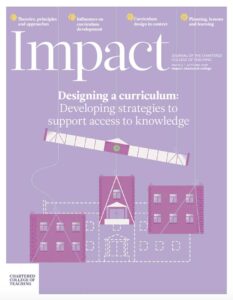Developing a new secondary school programme in applied learning: Reflections from the United Arab Emirates

The educational system in the United Arab Emirates (UAE) is experiencing significant change. To sustain the country’s prosperity, the UAE government has plans to move the basis of its economy from oil to knowledge and is investing significantly to develop a first-rate education system as set out in its National Agenda 2021 (Zaatari, 2017). This article reflects on one of the curriculum reforms, designed to prepare young people for the demands of a fast-changing society. The case study should appeal to readers interested in designing a relevant and engaging vocationally-oriented curriculum.
Background
The UAE’s Ministry of Education (MoE) has recently reorganised its public school secondary education into different streams to cater for the varying needs of students. The Professional Stream for Grades 9–12 (14–17-year-olds) focuses on applied learning. The term ‘professional’ is preferred to ‘vocational’ to reflect the programme’s status and because of the deep-rooted global stigma associated with the latter (Harbourne, 2014) (Taylor, 2017). Even the world-class German system of vocational education and training recently required a media campaign (‘Vocational learning – practically unbeatable’) to increase its attractiveness to young people (Federal Ministry of Education and Research, 2015). And yet, many countries report a growing gap between the skills that employers demand and what employees can actually do. In the UAE, one recent report reveals that 49% of employers believe that there is such a skills gap (Bayt, 2017).
Programme design
Against this background, the MoE piloted the Professional Stream in 2017/18 among 11 schools and around 300 Emirati students. Selection is based on the school principal’s recommendation, an interview by MoE staff and a test of students’ English language, mathematical and abstract reasoning skills, to determine the level of support they are likely to need. The programme aims to develop employability skills (e.g. teamwork, communication and problem-solving) and dispositions in authentic or near-authentic contexts (e.g. scenarios), while providing opportunities for students to explore career aspirations in specific electives (e.g. interactive multimedia and electrical engineering).
Students who complete the programme are awarded the Emirati Certificate in Applied Learning (EmCAL). This will provide entry into diploma courses in further education. Students aspiring to university can then progress to studying a degree in a relevant field. Each school has a designated professional coordinator to lead the programme locally, supported by a national manager and a central MoE team of specialists. Regular training days and communication through daily use of social media (Telegram) address operational issues and share ideas to motivate and inspire colleagues.
Effective curriculum design has core principles and values. The Professional Stream rests on providing real-life learning experiences and closely aligning classroom learning, where appropriate, to the world of work. The programme values enrichment and relevance. Visits to local businesses and guest speakers, work placements and active learning strategies enrich the curriculum. Lessons are made relevant by giving students opportunities to apply and develop their basic skills in real-life contexts. For example, students at Alorouba Secondary Boys School (Sharjah) visited a local television and radio studio to gain valuable knowledge and understanding of what happens behind the scenes in the production of programmes, from religious affairs to sports broadcasts. They learnt about the target audience, working to deadlines, programme layout, the use of correct lighting and the roles of technicians, editors and producers. The students were inspired to be presenters for the day, gaining confidence in expression, tone and other aspects of speaking and listening essential for the media industry.

Two key strands of the programme are employer engagement and careers guidance. The plans are for Grade 9 students to engage in regular dialogue about their career aspirations and the kinds of skills and work habits that are needed to achieve these. Students are to record their achievements in a Careers Passport, to form the basis of annual ‘pit stop’ reviews with the Professional Coordinator, who agrees targets set for the following year.
Although the MoE provides guidance on employer engagement, schools will be given considerable flexibility to meet local needs. In Grades 9 and 10, it is anticipated that this will mainly revolve around students practicing skills through problem-based scenarios and project groupwork. Hence in Al Ameer Boys’ Secondary School (in the northern emirate of Umm Al Quwain), Arabic and English-medium teachers plan closely together so that students explore hypotheses about speed and movement in the context of designing racetracks and testing model vehicles, building on their interest in the motor car industry. They program LED sensors to go on and off when the car passes a designated point. Meanwhile, students at Al Mutanabi School in Abu Dhabi develop filmmaking skills by visiting twoFour54, a major media and entertainment hub, and create commercials around future career paths in multimedia. Two work-based placements (each of 40 hours duration) are planned in Grades 11 and 12. This is framed around a simple ‘prepare, do and review’ model where teachers and employers prepare students for the placements (e.g. expectations regarding timekeeping, dress code and intended learning outcomes), set focused tasks for students to undertake during the placements (e.g. observations, shadowing, reflections) and review outcomes upon completion.
Challenges
The pilot findings highlight a variety of challenges, such as logistical issues (e.g. timely access to resources), sustaining parental support and ensuring programme coherence. The rationale behind the Professional Stream has also raised deeper questions about the purpose of education – is it to prepare students for the world of work, transmit knowledge, inculcate values, meet academic goals or perhaps a combination of these? These are universal questions that curriculum designers should consider carefully. In England, Turner (Turner, 2018) observes that schools pressed for time tend to opt for one curriculum purpose or another, rather than strike a balance.
Teachers in UAE public schools share with their colleagues around the world the high-stakes pressures associated with the Global Education Reform Movement (GERM). As the UAE Public Policy Forum notes, the schooling implications include a more prescriptive curriculum, test-based accountability and the learning of English as a means of preparing young people for jobs in a competitive market (Warner and Burton, 2017). For teachers in the Professional Stream, the strongly embedded transmission model of ‘delivering’ the curriculum competes with the more hands-on, experiential approach to building skills advocated as best practice in vocational learning (Lucas et al., 2012). Resolving these tensions as students get older and move between electives and core subjects, encountering different teaching styles, is likely to remain a long-term challenge.
The pilot has also highlighted several key factors to consider if the successful implementation of the programme is to be sustained. Having established a committed and enthusiastic team of teachers (in this case, Professional Coordinators), quality assurance systems are in the process of being developed to both support and challenge schools to achieve the programme’s aims. The intended learning outcomes, teaching approaches and assessment methods will need to be closely aligned. But the greatest challenge for the Ministry is to measure the effectiveness of the programme based on reliable and valid data. Broadly, the impact needs to be considered in terms of student outcomes and achievements, the quality of teaching and teachers’ professional development, the strength of partnership working (especially with employers and parents) and how well the programme is led and managed. Of course, the litmus test will be the extent to which students are confident, motivated and competent for the next stage of their education or employment.
Acknowledgements
I am grateful to the Professional Coordinators Tamara Thompson (Al Ameer School), Adnan Mahmood (Alorouba Secondary Boys Sharjah) and Mark Leonard (Al Mutanabi School) for their contributions.










